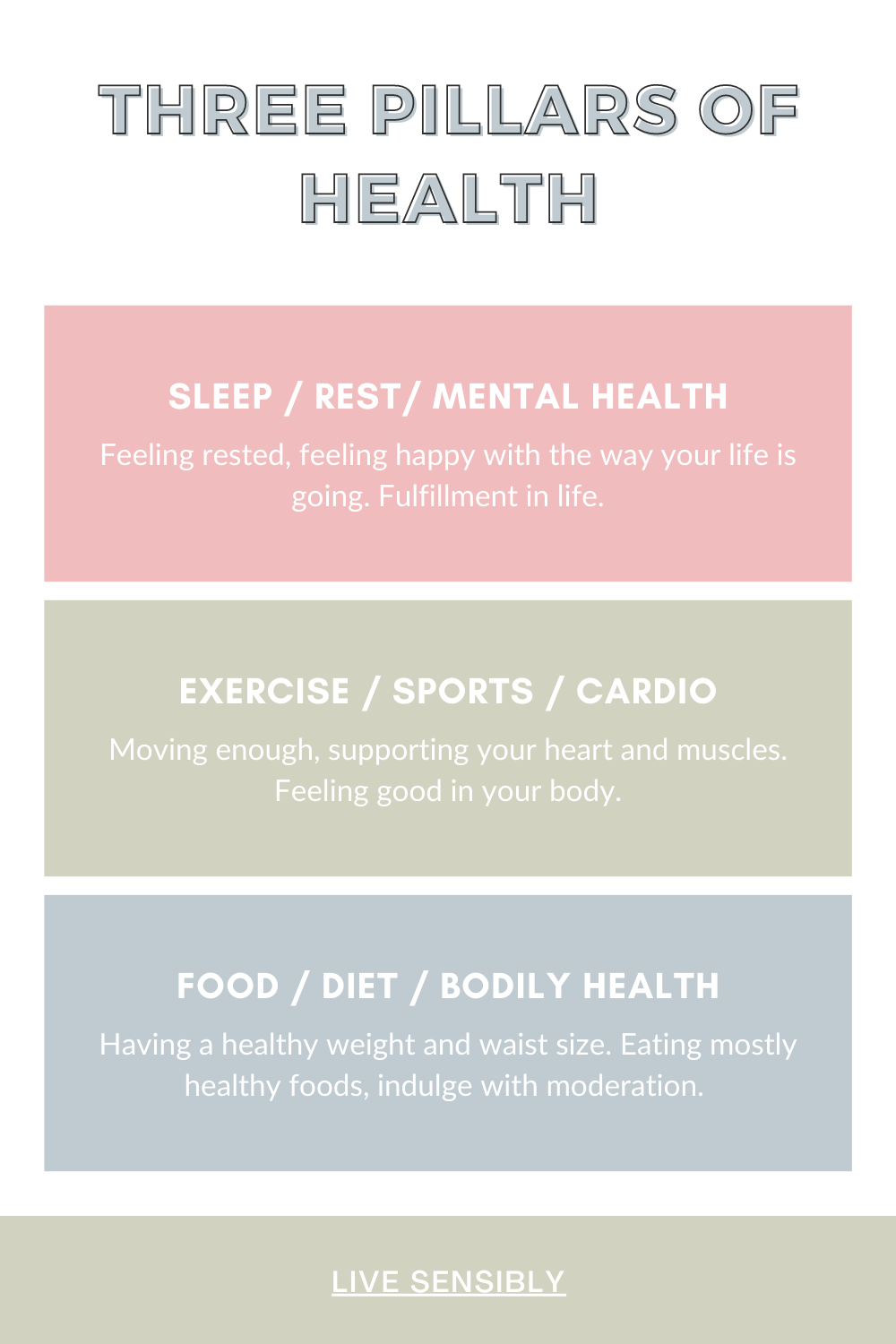Live Sensibly
With a reasonable effort, you can live in a way that minimizes health risks caused by lifestyle choices.
To live sensibly means that you put in a realistic effort to live a healthy lifestyle so you can minimize the risks of getting typical welfare diseases. It’s not a plan that you follow temporarily, it’s a lifestyle. That’s why it’s “sensibly”, by which I mean: it’s not that you can’t have your cake, you just can’t have all the cake all the time.
To live sensibly means realizing you need to exercise self-control at times. It also requires you to cultivate healthy habits. What you need to do to live more sensibly is up to you. I cannot look into your life and the challenges in your life. Everyone has their own constraints. The goal is to give it a reasonable effort, in your context. The premise behind this framework is to not fall for the all-or-nothing mentality. Putting in a reasonable effort is good enough. It’s a heck of a lot better than doing nothing.
The core ideas of live sensibly all come together in the three pillars of health. These pillars are:
1. Sleep / rest / mental health
2. Exercise / sports / cardiovascular health
3. Food / diet / bodily health

1st pillar: sleep, rest, mental health
Without enough sleep and rest you cannot live sensibly. People underestimate the value of having enough downtime, especially in our current productivity obsessed culture. In this pillar you can also find mental health and fulfillment with life: how are your stress levels? Do you feel happy with life? Is something missing? Can you relax?
Life feels much better when you are rested, and you feel like you are living the life you want. If you have problems here: what can you do about them? Some people are stuck here because they have no other option but to work three jobs, and they feel exhausted all the time. If that’s you: I’m so sorry, and I’m super mad that this is now so commonplace. Our society feels broken in that it cannot supply the basic needs of people at a reasonable price (food, shelter, jobs that pay a decent wage).
Tip: read the book Why We Sleep
2nd pillar: exercise, sports, cardiovascular health
The second pillar is about exercise and sports. These things are important for your health. We are meant to move around, not sit in chairs all day. Go for daily walks, even if that’s all you can do. Many governments have exercise guidelines, and they all roughly equate to: do about 150 minutes of cardio per week, spread out over multiple sessions. Do strengthening activities twice per week for your muscles. The goal of this pillar is to keep your heart and muscles healthy.
Cardio activities like brisk walking, running, cycling are good for your heart. Strengthening activities are obviously good for your muscles. Building muscle and maintaining it is very important when you reach an older age. Sarcopenia is the biggest risk here. The second pillar also circles back to the first pillar. Exercising can improve your mental health and make you sleep better.
To live sensibly in this pillar means that you create habits to make sure you exercise enough, even if you don’t like it. Even if all you do is walking, walk a little more over time. You can also embark on a quest to find a sport or type of exercise that you do enjoy. It took me years to find it, but I did find it in the end!
3rd pillar: food, diet, bodily health
The third pillar is about food and fueling your body. The goal is to have a healthy weight and waist size. Having too much abdominal fat is risky for your health in the long run. This pillar is easy for some and very hard for others.
First off: you should try to gather some data about yourself regarding food. Use this free calculator to figure out how many calories you need per day. Armed with this knowledge, track your food intake for at least a couple of days in an app like MyFitnessPal without changing your habits (yet). Compare the results.
If you want to lose weight, do it sensibly. Don’t eat in a calorie deficit of more than 500 calories. Anyone can follow a strict diet for some time, but it’s not sustainable. If you take it slow (and easier) chances are higher that you can keep the weight off. Look for changes in your eating habits and don’t go on a crash diet. Eat your veggies, your fruits. Keep room for a bit of purely fun eating. The heuristic I use myself is the 80/20 rule. 80% of my food habits are super healthy so I have room for 20% fun eating. Weigh yourself three times per week and gauge your progress by using weekly averages.
If you want help with the eating part, I’m here for you. As a nutrition coach, I can teach you the skills to eat sensibly. Go ahead and plan a free intro call with me.
Most national governments have guidelines of what it means to eat healthily. Consulting those can give you an idea of where you should aim to be with regards to your eating habits. I personally think the government guidelines are often overly strict, but you can still use them as a starting point.
The 🔑 to live sensibly
I believe that, if you give it a realistic effort, you can improve your health to be just fine. You won’t be the fittest person on earth, but you don’t need to be. You just need to be better than average. You can be way above average, but that also requires way more than average efforts. Give it a realistic effort and see where you can get with that. If you like what you see, you can always decide to go further. But take small steps first.
The core ingredient is giving it a realistic effort. There are no shortcuts to a decent health. There is no magic pill. The magic pill is the effort you bring. You can’t have your cake and eat it too. But with my approach at least you can have some cake, just choose to eat your cake sensibly.
The reason why I believe in this approach is that I see extreme approaches failing. People often go into changing their lives with an all-or-nothing mentality. This is because people want quick results and this urge is exploited by many: crash diet books or courses, extremely strict diets, magic fat burning pills, fat-melting devices, low kcal meal replacement drinks. It’s all bullshit. It’s a trap! When you go for change with an all-in mentality you’ll bounce right back to old habits the moment an extreme plan is finished or fails. Then you’re right back where you started or worse off.
So please, choose to live sensibly. Focus on: the process over outcomes, cultivate patience, take small steps, take sustainable steps, allowing yourself to fail then going back on track, being kind to yourself, doing what you can do given your life circumstances. The process is key. Find a way to make the process sustainable and the results will follow. The consequence is that you’ll reach your results at a slower pace. That is why this approach will never be sexy or popular.
I have lived according to these principles for over 18 years. I feel healthy and strong. I don’t feel like I cannot enjoy life, I enjoy the occasional drink and I have plenty of food just for fun. But yes, I do employ self-control too. I sleep 7.5+ hours per night, I go to the gym even when I don’t feel like it, I don’t indulge in everything I want. Interestingly, saying “no” to my desires when it’s required also makes me feel stronger mentally. For me, it’s fun to work on my health in a sensible way.
It can be this way for you too. You choose. Feel free to ask any questions you might have.



Comments ()